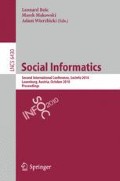Abstract
Teams are an important organizational unit and need to be composed appropriately. Whenever a high number of possible team members exists, the complexity of the composition task can not be effectively handled by humans. To support the composition in this scenario, team recommenders can be used. In this paper we discuss and formalize a flexible approach using a generic meta model for implementing various team composition strategies derived from a literature review. In order to demonstrate its use and its compatibility with a generic team recommendation approach, we then translate some of the theoretical team composition approaches found in the literature.
Access this chapter
Tax calculation will be finalised at checkout
Purchases are for personal use only
Preview
Unable to display preview. Download preview PDF.
References
Ancona, D.G., Caldwell, D.E.: Demography and design: predictors of new product team performance. Tech. rep. (1989)
Bouncken, R.B., Winkler, V.: Global innovation teams: cultural team composition, language capacities, and experience as success factors. European Journal of Management (June 2008)
Brocco, M., Groh, G.: Team recommendation in open innovation networks. In: RecSys 2009: Proceedings of the third ACM conference on Recommender systems, pp. 365–368. ACM, New York (2009)
Brocco, M., Groh, G., Kern, C.: On the influence of social factors on team recommendations. In: Proc. Second International Workshop on Modeling, Managing and Mining of Evolving Social Networks (M3SN), 26th IEEE International Conference on Data Engineering (2010)
Chen, S.-J., Lin, L.: Modeling team member characteristics for the formation of a multifunctional team in concurrent engineering. IEEE Transactions on Engineering Management 51(2), 111–124 (2004)
Chesbrough, H.W., Vanhaverbeke, W., West, J.: Open innovation: researching a new paradigm, illustrated, reprint ed. Oxford University Press, Oxford (2006)
Colucci, S., Noia, T.D., Sciascio, E.D., Donini, F.M., Piscitelli, G., Coppi, S.: Knowledge based approach to semantic composition of teams in an organization. In: SAC 2005: Proceedings of the 2005 ACM symposium on Applied computing, pp. 1314–1319. ACM, New York (2005)
Hall, E.T., Hall, M.R.: Understanding cultural differences: Germans, French and Americans. Intercultural Press, Yarmouth (1990)
Harrison, D.A., Klein, K.J.: What’s the difference? Diversity constructs as separation, variety, or disparity in organizations. The Academy of Management Review 32(4), 1199–1228 (2007)
Kurtzberg, T.R., Amabile, T.M.: From guilford to creative synergy: Opening the black box of team level creativity. Creativity Research Journal 13, 285–294 (2000)
Mello, A.S., Ruckes, M.E.: Team composition. Journal of Business 79(3), 1019–1040 (2006)
Nunamaker, J., Dennis, A., Valacich, J., Vogel, D., George, J.: Electronic meeting systems to support group work. Communications of the ACM 34(7), 40–61 (1991)
Pelled, L.H.: Demographic diversity, conflict and work group outcomes: An intervening process theory. Organization Science 7, 615–631 (1996)
Powell, W.W., Grodal, S.: Networks of Innovators. In: The Oxford Handbook of Innovation, pp. 56–85. Oxford University Press, Oxford (2005)
Schippers, M.C., Hartog, D.N.D., Koopman, P.L., Wienk, J.A.: Diversity and team outcomes: the moderating effects of outcome interdependence and group longevity and the mediating effect of reflexivity. Journal of Organizational Behavior 24(6), 779–802 (2003)
Author information
Authors and Affiliations
Editor information
Editors and Affiliations
Rights and permissions
Copyright information
© 2010 Springer-Verlag Berlin Heidelberg
About this paper
Cite this paper
Brocco, M., Groh, G., Forster, F. (2010). A Meta Model for Team Recommendations. In: Bolc, L., Makowski, M., Wierzbicki, A. (eds) Social Informatics. SocInfo 2010. Lecture Notes in Computer Science, vol 6430. Springer, Berlin, Heidelberg. https://doi.org/10.1007/978-3-642-16567-2_3
Download citation
DOI: https://doi.org/10.1007/978-3-642-16567-2_3
Publisher Name: Springer, Berlin, Heidelberg
Print ISBN: 978-3-642-16566-5
Online ISBN: 978-3-642-16567-2
eBook Packages: Computer ScienceComputer Science (R0)

